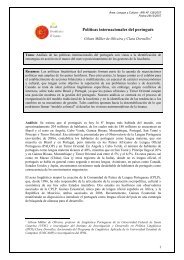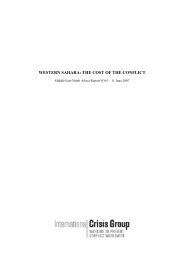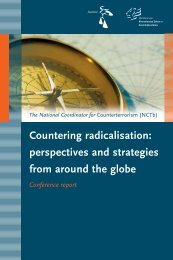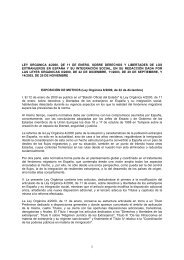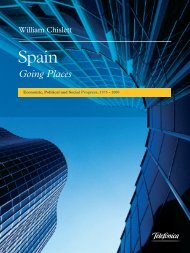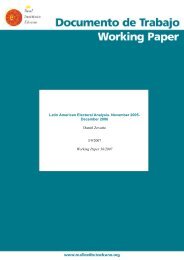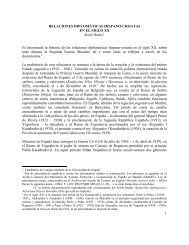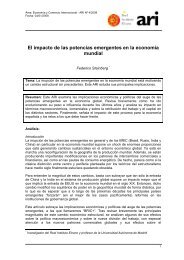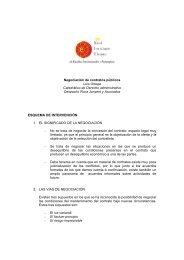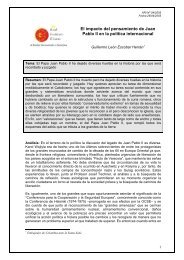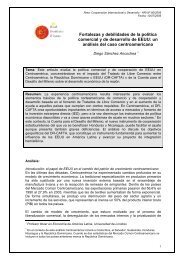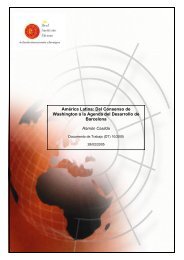Spain and the United States - Real Instituto Elcano
Spain and the United States - Real Instituto Elcano
Spain and the United States - Real Instituto Elcano
You also want an ePaper? Increase the reach of your titles
YUMPU automatically turns print PDFs into web optimized ePapers that Google loves.
98<br />
SPAIN AND THE UNITED STATES<br />
demographic, sociological, cultural, political <strong>and</strong> economic potential of <strong>the</strong><br />
until <strong>the</strong>n less-than-defined Hispanic community, that really awakened <strong>the</strong><br />
government’s interest. This census also coincided with <strong>the</strong> rapid emergence in<br />
<strong>Spain</strong> of a large community of immigrants from Latin America (1.45 million at<br />
<strong>the</strong> beginning of 2005, compared with a total of 165,000 foreign residents of<br />
all nationalities in <strong>Spain</strong> in 1976).<br />
José María Aznar, <strong>Spain</strong>’s former prime minister (1996-2004), visited<br />
several Hispanic states during his frequent visits to <strong>the</strong> <strong>United</strong> <strong>States</strong> but took<br />
a partisan approach towards <strong>the</strong> community. For example, he offered to<br />
campaign for <strong>the</strong> Republicans. This was a risky strategy, particularly as<br />
Hispanics tend to vote for <strong>the</strong> Democrats (John Kerry got 53% of <strong>the</strong> Hispanic<br />
vote in <strong>the</strong> November 2004 election), <strong>and</strong> not one that <strong>Spain</strong>’s ruling Socialists<br />
are following, although <strong>the</strong> Democrats are <strong>the</strong> natural allies of <strong>the</strong> Socialists.<br />
Of <strong>the</strong> 21.5 million registered Hispanic voters, only around seven million of<br />
<strong>the</strong>m voted.<br />
There are several areas where <strong>Spain</strong> can work with <strong>the</strong> Hispanic<br />
community, most notably establishing better institutional relations with bodies<br />
representing Hispanics, such as <strong>the</strong> New America Alliance, <strong>the</strong> Greater Miami<br />
Chamber of Commerce <strong>and</strong> <strong>the</strong> Hispanic Business Round Table, jointly<br />
working on Spanish-language projects <strong>and</strong> finding ways for Spanish<br />
companies to participate in Hispanic companies, particularly in <strong>the</strong> field of<br />
culture (cinema, TV, music, etc). But it should always be borne in mind that,<br />
as Emilio Cassinello, former Consul General in New York, points out,<br />
“approaching <strong>the</strong> Hispanic community means approaching <strong>the</strong> <strong>United</strong> <strong>States</strong>.<br />
We must always keep in mind that Hispanics <strong>and</strong> <strong>the</strong> US cannot be analysed as<br />
two dissociable entities.” Relationships can, <strong>and</strong> indeed are, being developed<br />
with Hispanic political leaders from both <strong>the</strong> Republican <strong>and</strong> Democratic<br />
parties (for example, with <strong>the</strong> two Hispanic senators, Republican Mel Martinez<br />
<strong>and</strong> Democrat Ken Salazar), but this has to be done without becoming involved<br />
in US internal politics.<br />
A key player on both sides of <strong>the</strong> Atlantic is <strong>the</strong> <strong>United</strong> <strong>States</strong>-<strong>Spain</strong><br />
Council, which was created in 1995 during <strong>the</strong> third Socialist government of<br />
Felipe González to encourage underst<strong>and</strong>ing of shared interests <strong>and</strong> promote<br />
constructive relations <strong>and</strong> cooperation between <strong>the</strong> Spanish <strong>and</strong> American<br />
governments on a variety of issues, including trade intellectual property rights<br />
<strong>and</strong> education. The Council, whose US president is Mel Martinez, meets once<br />
a year, alternating between <strong>Spain</strong> <strong>and</strong> <strong>the</strong> <strong>United</strong> <strong>States</strong>. Its members include<br />
government officials, members of <strong>the</strong> Spanish parliament <strong>and</strong> <strong>the</strong> US Senate,<br />
businessmen <strong>and</strong> academics. It is a useful talking shop <strong>and</strong> forum for<br />
networking <strong>and</strong> could act as a kind of lobby.



